9 dec 2018
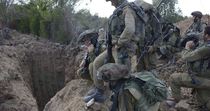
Israel's army said on Saturday it had located another tunnel crossing into its territory from Lebanon, the third such discovery since launching an operation to expose and destroy alleged Hezbollah "attack tunnels".
The Israeli military “has located an additional Hezbollah cross-border attack tunnel," spokesman Jonathan Conricus claimed, declining to give details on its precise location or dimensions.
"The tunnel crosses into Israel; like the first tunnel it is not yet operational and does not pose an imminent threat to Israeli communities," he said in a briefing with journalists, according to AFP.
On Tuesday, the army launched an operation dubbed "Northern Shield" to destroy tunnels it said were dug under the border by the Shiite militant group Hezbollah.
On Thursday, the military announced that it had uncovered a second Hezbollah tunnel crossing into Israeli territory, Haaretz reported.
Conricus said on Saturday that the army had placed explosives in the newly exposed tunnel to prevent its use as a means to infiltrate Israel, but had not yet destroyed it.
Despite not having its exact location, Conricus said Israel asked UNIFIL, the UN mission monitoring the border region, to "take action and block the tunnel on the Lebanese side".
Following the army's announcement, Israel’s Prime Minister Benjamin Netanyahu said that the operation to track the tunnels "is in its beginning".
"We'll continue to act till its completion," he said in a statement.
The announcement of the new find came after Israeli soldiers on Saturday opened fire at what they perceived to be three "Hezbollah activists" approaching the border where the army was carrying out engineering work.
Lebanon's official NNA news agency said Israeli forces fired shots in the air east of the village of Mays al-Jabal after they had been surprised because of heavy fog by a routine Lebanese army patrol.
The Israeli military “has located an additional Hezbollah cross-border attack tunnel," spokesman Jonathan Conricus claimed, declining to give details on its precise location or dimensions.
"The tunnel crosses into Israel; like the first tunnel it is not yet operational and does not pose an imminent threat to Israeli communities," he said in a briefing with journalists, according to AFP.
On Tuesday, the army launched an operation dubbed "Northern Shield" to destroy tunnels it said were dug under the border by the Shiite militant group Hezbollah.
On Thursday, the military announced that it had uncovered a second Hezbollah tunnel crossing into Israeli territory, Haaretz reported.
Conricus said on Saturday that the army had placed explosives in the newly exposed tunnel to prevent its use as a means to infiltrate Israel, but had not yet destroyed it.
Despite not having its exact location, Conricus said Israel asked UNIFIL, the UN mission monitoring the border region, to "take action and block the tunnel on the Lebanese side".
Following the army's announcement, Israel’s Prime Minister Benjamin Netanyahu said that the operation to track the tunnels "is in its beginning".
"We'll continue to act till its completion," he said in a statement.
The announcement of the new find came after Israeli soldiers on Saturday opened fire at what they perceived to be three "Hezbollah activists" approaching the border where the army was carrying out engineering work.
Lebanon's official NNA news agency said Israeli forces fired shots in the air east of the village of Mays al-Jabal after they had been surprised because of heavy fog by a routine Lebanese army patrol.
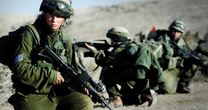
Israeli soldiers at the Lebanese border opened fire at alleged Hezbollah activists on Saturday, the first such incident since Israel launched a crackdown on cross-border tunnels, the military said.
Lebanon's state-run National News Agency, however, said the Israeli soldiers shot into the air when they saw a Lebanese army patrol near the border demarcation, known as the "Blue Line".
Israeli sources said the suspects approached an area on the Israeli side of the border where its forces were carrying out an operation to shut down tunnels that were allegedly dug across the border by Hezbollah.
Israeli military spokesman Jonathan Conricus told reporters that three civilian-dressed individuals identified as Hezbollah operatives tried to use the heavy fog and rain in the area "to approach and interfere with, or to take, sensors" that had been deployed there by the army.
But Lebanon gave a different account of the incident. "Israeli enemy soldiers shot into the air following their deployment near the Blue Line in Kroum al-Sharaqi region to the east of Meis al-Jabal village," NNA said.
The Israelis "were surprised, due to thick fog, by a routine Lebanese army patrol inside the Lebanese territories," it added.
Israel's military claimed on Tuesday it had found passages dug across the Israel-Lebanon border to be used for carrying out attacks inside Israel. It sent mechanical diggers, troops and anti-tunneling equipment there to shut them down.
The Israeli military has said its activity would, for now, stop on the Israeli side of the border. But a cabinet minister said on Friday that Israel was prepared to take action in Lebanon against cross-border tunnels if deemed necessary.
Lebanon's state-run National News Agency, however, said the Israeli soldiers shot into the air when they saw a Lebanese army patrol near the border demarcation, known as the "Blue Line".
Israeli sources said the suspects approached an area on the Israeli side of the border where its forces were carrying out an operation to shut down tunnels that were allegedly dug across the border by Hezbollah.
Israeli military spokesman Jonathan Conricus told reporters that three civilian-dressed individuals identified as Hezbollah operatives tried to use the heavy fog and rain in the area "to approach and interfere with, or to take, sensors" that had been deployed there by the army.
But Lebanon gave a different account of the incident. "Israeli enemy soldiers shot into the air following their deployment near the Blue Line in Kroum al-Sharaqi region to the east of Meis al-Jabal village," NNA said.
The Israelis "were surprised, due to thick fog, by a routine Lebanese army patrol inside the Lebanese territories," it added.
Israel's military claimed on Tuesday it had found passages dug across the Israel-Lebanon border to be used for carrying out attacks inside Israel. It sent mechanical diggers, troops and anti-tunneling equipment there to shut them down.
The Israeli military has said its activity would, for now, stop on the Israeli side of the border. But a cabinet minister said on Friday that Israel was prepared to take action in Lebanon against cross-border tunnels if deemed necessary.
6 dec 2018

Israeli opposition leader Tzipi Livni (Photo by the Times of Israel)
Israeli opposition leader Tzipi Livni has criticized Prime Minister Benjamin Netanyahu for overdramatizing a recent operation by the Israeli military to block what it claims are tunnels the Hezbollah resistance movement has dug from Lebanon into the occupied territories “for political gain.”
Livni told the Kan public broadcaster that while she and the rest of the opposition welcomed the army’s operation to find and destroy the alleged tunnels, it “must be kept in proportion.”
“We are not now in a situation where our soldiers are behind enemy lines. We are talking about engineering activity …,” she said, accusing Netanyahu of “blowing the incident out of proportion.”
On Tuesday, the Israeli military announced an operation against what it said were Hezbollah infiltration tunnels.
Lebanese Parliament Speaker Nabih Berri said on Wednesday that the Israeli regime had failed to provide any evidence for alleged tunnels dug from Lebanon into the occupied territories by Hezbollah fighters.
“The Israelis did not present any information” at the meeting with the Lebanese army and UNIFIL [United Nations Interim Force in Lebanon] peacekeeping force, a statement from Berri's office said.
Berri further noted that Lebanon had asked for geographic coordinates but received none.
“This (Israeli accusation) is not based on any real facts at all,” Ali Bazzi, a lawmaker from Berri's Amal Movement, cited him as saying after a meeting.
Lebanon's Foreign Ministry is going to submit a complaint to the United Nations about “repeated Israeli violations,” according to a report published by Lebanon’s official National News Agency (NNA).
Meanwhile, Russia has called on Israel to uphold UN Security Council Resolution 1701 in the wake of its recent military activities near the border with Lebanon.
Speaking at a press briefing on Wednesday, Russia's Foreign Ministry spokeswoman Maria Zakharova said Moscow hoped that no actions would be in conflict with the resolution, which ended the 2006 Israeli aggression against Lebanon and called on the Israeli regime to respect Lebanon’s sovereignty and territorial integrity.
The Lebanese military has stated that it is prepared for any developments on the border with Israel, making efforts together with UNIFIL to maintain stability in the area.
“Everything is calm and peaceful on the Lebanese side [of the border]. The situation is under full control. The army units deployed in the area are fulfilling their tasks in coordination with UNIFIL in order to prevent any provocation and maintain stability in the southern region. The army was ready for any emergency situations,” the military announced in a statement.
The Lebanese army added that it remained in contact both with Israel and Hezbollah to help de-escalate tensions and prevent any confrontation.
Israeli opposition leader Tzipi Livni has criticized Prime Minister Benjamin Netanyahu for overdramatizing a recent operation by the Israeli military to block what it claims are tunnels the Hezbollah resistance movement has dug from Lebanon into the occupied territories “for political gain.”
Livni told the Kan public broadcaster that while she and the rest of the opposition welcomed the army’s operation to find and destroy the alleged tunnels, it “must be kept in proportion.”
“We are not now in a situation where our soldiers are behind enemy lines. We are talking about engineering activity …,” she said, accusing Netanyahu of “blowing the incident out of proportion.”
On Tuesday, the Israeli military announced an operation against what it said were Hezbollah infiltration tunnels.
Lebanese Parliament Speaker Nabih Berri said on Wednesday that the Israeli regime had failed to provide any evidence for alleged tunnels dug from Lebanon into the occupied territories by Hezbollah fighters.
“The Israelis did not present any information” at the meeting with the Lebanese army and UNIFIL [United Nations Interim Force in Lebanon] peacekeeping force, a statement from Berri's office said.
Berri further noted that Lebanon had asked for geographic coordinates but received none.
“This (Israeli accusation) is not based on any real facts at all,” Ali Bazzi, a lawmaker from Berri's Amal Movement, cited him as saying after a meeting.
Lebanon's Foreign Ministry is going to submit a complaint to the United Nations about “repeated Israeli violations,” according to a report published by Lebanon’s official National News Agency (NNA).
Meanwhile, Russia has called on Israel to uphold UN Security Council Resolution 1701 in the wake of its recent military activities near the border with Lebanon.
Speaking at a press briefing on Wednesday, Russia's Foreign Ministry spokeswoman Maria Zakharova said Moscow hoped that no actions would be in conflict with the resolution, which ended the 2006 Israeli aggression against Lebanon and called on the Israeli regime to respect Lebanon’s sovereignty and territorial integrity.
The Lebanese military has stated that it is prepared for any developments on the border with Israel, making efforts together with UNIFIL to maintain stability in the area.
“Everything is calm and peaceful on the Lebanese side [of the border]. The situation is under full control. The army units deployed in the area are fulfilling their tasks in coordination with UNIFIL in order to prevent any provocation and maintain stability in the southern region. The army was ready for any emergency situations,” the military announced in a statement.
The Lebanese army added that it remained in contact both with Israel and Hezbollah to help de-escalate tensions and prevent any confrontation.
5 dec 2018
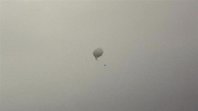
This picture shows an Israeli air balloon with surveillance cameras flying over Meiss Ej Jabal village in the Marjeyoun district of Lebanon’s southern province of Nabatieh on December 5, 2018. (Photo by Lebanon’s National News Agency)
The Israeli military has reportedly launched an air balloon with surveillance cameras from one of its military positions over a village in Lebanon’s southern province of Nabatieh in light of a recent operation Israel has undertaken to block what it claims are tunnels Hezbollah resistance movement has dug into occupied territories.
Lebanon’s official National News Agency (NNA) reported on Wednesday that Israeli forces flew the balloon over Meiss Ej Jabal village in the Marjeyoun district of the province.
The report added that Israeli troops have also installed a surveillance camera on the outskirts of Kafar Kila village near the cement separation wall between Lebanon and occupied lands.
Local sources, requesting not to be named, said the camera was pointed at Lebanese territories.
Berri: Israel gave no proof of Hezbollah border tunnels
Meanwhile, Lebanese Parliament Speaker Nabih Berri says the Israeli regime has failed to provide any evidence for alleged tunnels dug from Lebanon into occupied territories by Hezbollah resistance fighters.
“The Israelis did not present any information” at the meeting with the Lebanese army and the UNIFIL peacekeeping force, a statement from Berri's office said.
Berri further noted that Lebanon had asked for geographic coordinates but received none.
“This (Israeli accusation) is not based on any real facts at all,” Ali Bazzi, a lawmaker from Berri's Amal Movement cited him as saying after a meeting.
Furthermore, Lebanon's Foreign Ministry is going to submit a complaint to the United Nations about “repeated Israeli violations,” according to a report published by NNA.
The developments came only a day after the Israeli military announced an operation against what it said were Hezbollah infiltration tunnels.
Also on Wednesday, Russia called on Israel to uphold United Nations Security Council Resolution 1701 in the wake of its recent military activities near the border with Lebanon.
Speaking at a press briefing, Russia's Foreign Ministry Spokeswoman Maria Zakharova said Moscow hopes that no actions will be in conflict with the resolution, which ended the 2006 Israeli aggression against Lebanon and calls on the Israeli regime to respect Lebanon’s sovereignty and territorial integrity.
The Lebanese military has stated that it is prepared for any developments on the border with Israel, making efforts together with the United Nations Interim Force in Lebanon (UNIFIL) to maintain stability in the area.
“Everything is calm and peaceful on the Lebanese side [of the border]. The situation is under full control. The army units deployed in the area are fulfilling their tasks in coordination with the UNIFIL in order to prevent any provocation and maintain stability in the southern region. The army was ready for any emergency situations,” the military announced in a statement.
The Lebanese army added that it remained in contact both with Israel and Hezbollah, calling on them to use all the mechanisms to de-escalate tensions and prevent any confrontation.
The Israeli military has reportedly launched an air balloon with surveillance cameras from one of its military positions over a village in Lebanon’s southern province of Nabatieh in light of a recent operation Israel has undertaken to block what it claims are tunnels Hezbollah resistance movement has dug into occupied territories.
Lebanon’s official National News Agency (NNA) reported on Wednesday that Israeli forces flew the balloon over Meiss Ej Jabal village in the Marjeyoun district of the province.
The report added that Israeli troops have also installed a surveillance camera on the outskirts of Kafar Kila village near the cement separation wall between Lebanon and occupied lands.
Local sources, requesting not to be named, said the camera was pointed at Lebanese territories.
Berri: Israel gave no proof of Hezbollah border tunnels
Meanwhile, Lebanese Parliament Speaker Nabih Berri says the Israeli regime has failed to provide any evidence for alleged tunnels dug from Lebanon into occupied territories by Hezbollah resistance fighters.
“The Israelis did not present any information” at the meeting with the Lebanese army and the UNIFIL peacekeeping force, a statement from Berri's office said.
Berri further noted that Lebanon had asked for geographic coordinates but received none.
“This (Israeli accusation) is not based on any real facts at all,” Ali Bazzi, a lawmaker from Berri's Amal Movement cited him as saying after a meeting.
Furthermore, Lebanon's Foreign Ministry is going to submit a complaint to the United Nations about “repeated Israeli violations,” according to a report published by NNA.
The developments came only a day after the Israeli military announced an operation against what it said were Hezbollah infiltration tunnels.
Also on Wednesday, Russia called on Israel to uphold United Nations Security Council Resolution 1701 in the wake of its recent military activities near the border with Lebanon.
Speaking at a press briefing, Russia's Foreign Ministry Spokeswoman Maria Zakharova said Moscow hopes that no actions will be in conflict with the resolution, which ended the 2006 Israeli aggression against Lebanon and calls on the Israeli regime to respect Lebanon’s sovereignty and territorial integrity.
The Lebanese military has stated that it is prepared for any developments on the border with Israel, making efforts together with the United Nations Interim Force in Lebanon (UNIFIL) to maintain stability in the area.
“Everything is calm and peaceful on the Lebanese side [of the border]. The situation is under full control. The army units deployed in the area are fulfilling their tasks in coordination with the UNIFIL in order to prevent any provocation and maintain stability in the southern region. The army was ready for any emergency situations,” the military announced in a statement.
The Lebanese army added that it remained in contact both with Israel and Hezbollah, calling on them to use all the mechanisms to de-escalate tensions and prevent any confrontation.
4 dec 2018
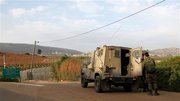
This picture, taken on December 4, 2018 near the town of Metula in the northern parts of Israeli-occupied territories, shows Israeli soldiers standing outside a military vehicle near Lebanon’s border. (By AFP)
The Israeli military has launched an operation along Lebanon’s border under the pretext of “cutting off” what it claims are tunnels dug by the Lebanese Hezbollah resistance movement near the occupied territories.
It announced the operation on Twitter on Tuesday, saying that a number of areas close to Lebanon’s border, including Metula, had been declared a closed military zone.
Israeli military spokesperson Lieutenant Colonel Jonathan Conricus claimed that that “a number of tunnels” had penetrated the Israeli-occupied territories.
He said that the operation would not cross the border into Lebanon.
Conricus, however, said the tunnels “are not yet operationally ready” and therefore did not pose an “immediate threat.”
He claimed that Hezbollah has been developing an offensive plan that would “shift the battleground into Israel.”
Hezbollah would use firepower and ground units and “the surprise component of that plan was supposed to be tunnels that would allow infiltrators into Israel,” he claimed.
According to unnamed Israeli officials, the operation would likely “take weeks.”
The Israeli army reportedly deployed tanks and construction vehicles near the Lebanese frontier around midnight on Monday.
Israeli military spokesperson Avichay Adraee said the Lebanese government was responsible for the build-up of the tunnels.
Lebanese media also said forces with the United Nations peacekeeping force, known as UNIFIL, monitored the Israeli operations, and that the Lebanese army did routine patrols in the surrounding towns.
In a statement Tuesday carried by the state-run National News Agency, a UNIFIL official said the situation in the area was calm.
The resistance movement Hezbollah was formed following the Israeli regime’s invasion of Lebanon and the ensuing occupation of its southern parts in the 1980s, and currently constitutes Lebanon’s de facto military power.
Since then, the movement has helped the national army retake the occupied regions from Tel Aviv and thwart two Israeli acts of aggression in 2000 and 2006.
The movement has also been playing a significant role in the Syrian army’s fight against Takfiri terrorist groups, including Daesh and al-Nusra Front, thus preventing the spillover of the war into Lebanon.
Hezbollah is also a powerful political party in Lebanon. The movement and its allies currently hold over half of parliamentary seats in the country.
Since the end of the 2006 war, Israeli forces have regularly violated Lebanon’s sovereignty, with the regime’s officials threatening another military offensive against the Arab country.
Hezbollah has repeatedly warned the regime in Tel Aviv against launching a new war, vowing a crushing response to any such attempt.
The Israeli military has launched an operation along Lebanon’s border under the pretext of “cutting off” what it claims are tunnels dug by the Lebanese Hezbollah resistance movement near the occupied territories.
It announced the operation on Twitter on Tuesday, saying that a number of areas close to Lebanon’s border, including Metula, had been declared a closed military zone.
Israeli military spokesperson Lieutenant Colonel Jonathan Conricus claimed that that “a number of tunnels” had penetrated the Israeli-occupied territories.
He said that the operation would not cross the border into Lebanon.
Conricus, however, said the tunnels “are not yet operationally ready” and therefore did not pose an “immediate threat.”
He claimed that Hezbollah has been developing an offensive plan that would “shift the battleground into Israel.”
Hezbollah would use firepower and ground units and “the surprise component of that plan was supposed to be tunnels that would allow infiltrators into Israel,” he claimed.
According to unnamed Israeli officials, the operation would likely “take weeks.”
The Israeli army reportedly deployed tanks and construction vehicles near the Lebanese frontier around midnight on Monday.
Israeli military spokesperson Avichay Adraee said the Lebanese government was responsible for the build-up of the tunnels.
Lebanese media also said forces with the United Nations peacekeeping force, known as UNIFIL, monitored the Israeli operations, and that the Lebanese army did routine patrols in the surrounding towns.
In a statement Tuesday carried by the state-run National News Agency, a UNIFIL official said the situation in the area was calm.
The resistance movement Hezbollah was formed following the Israeli regime’s invasion of Lebanon and the ensuing occupation of its southern parts in the 1980s, and currently constitutes Lebanon’s de facto military power.
Since then, the movement has helped the national army retake the occupied regions from Tel Aviv and thwart two Israeli acts of aggression in 2000 and 2006.
The movement has also been playing a significant role in the Syrian army’s fight against Takfiri terrorist groups, including Daesh and al-Nusra Front, thus preventing the spillover of the war into Lebanon.
Hezbollah is also a powerful political party in Lebanon. The movement and its allies currently hold over half of parliamentary seats in the country.
Since the end of the 2006 war, Israeli forces have regularly violated Lebanon’s sovereignty, with the regime’s officials threatening another military offensive against the Arab country.
Hezbollah has repeatedly warned the regime in Tel Aviv against launching a new war, vowing a crushing response to any such attempt.
29 nov 2018

An image grab taken from Lebanon-based Arabic-language al-Manar television network on October 12, 2018, shows the Secretary General of Lebanon's Hezbollah resistance movement Sayyed Hassan Nasrallah giving a televised speech broadcast from the Lebanese capital city of Beirut.
Commander of the Israeli military’s 300th Infantry Brigade has called on the Tel Aviv regime to resort to the policy of “targeted killings,” arguing that the assassination of the Secretary General of Hezbollah will deal a fatal blow to the Lebanese resistance movement.
Colonel Roy Levy, in an article published in the Hebrew-language Ma'arakhot magazine, which is affiliated to the Israeli army, wrote that “targeted killings" must be carried out, and that Sayyed Hassan Nasrallah should be killed by commando forces backed by the air force, the Hebrew-language Walla news website reported.
“His personality and military experience have turned him into a center of gravity. All of his organization - from senior commanders to the low-ranking soldiers - and thus the fighting spirit of the enemy will be harmed once he is targeted,” Levy wrote.
He then recommended Israeli military operations deep inside Lebanon, asserting that the offensives would yield many benefits despite the risks associated with them.
The Israeli military commander also called for “a proper positioning of combat commando units with the aim of subjugating the enemy.”
“Should we make a similar decision and kill the leaders of enemy organizations, for example, Nasrallah? The answer is not easy.
“But the idea of harming the enemy's fighting spirit by damaging its property must be examined. We must adopt a policy not anchored in force, but in ruse instead. The deep activity of commandos in a way that surprises the enemy and strikes its equipment will be an important means of damaging its fighting morale, and will lead to its defeat,” Levy commented.
On November 28, 2017, the Israeli military's chief spokesman said Nasrallah would be a target for assassination in any war between Israel and Hezbollah.
Ronen Manelis added that the Israeli military is conducting psychological and media warfare against Hezbollah.
“One of the things we talk about is the transition from traditional media consumption to social media,” Manelis said, adding, “We are also active in this theater, and it is an operational theater in every respect. Just in the past few weeks, we’ve taken a great many actions that caused consternation on the other side.”
“There won’t be a clear victory picture in the text war, though it’s clear that Nasrallah is a target,” he added.
Commander of the Israeli military’s 300th Infantry Brigade has called on the Tel Aviv regime to resort to the policy of “targeted killings,” arguing that the assassination of the Secretary General of Hezbollah will deal a fatal blow to the Lebanese resistance movement.
Colonel Roy Levy, in an article published in the Hebrew-language Ma'arakhot magazine, which is affiliated to the Israeli army, wrote that “targeted killings" must be carried out, and that Sayyed Hassan Nasrallah should be killed by commando forces backed by the air force, the Hebrew-language Walla news website reported.
“His personality and military experience have turned him into a center of gravity. All of his organization - from senior commanders to the low-ranking soldiers - and thus the fighting spirit of the enemy will be harmed once he is targeted,” Levy wrote.
He then recommended Israeli military operations deep inside Lebanon, asserting that the offensives would yield many benefits despite the risks associated with them.
The Israeli military commander also called for “a proper positioning of combat commando units with the aim of subjugating the enemy.”
“Should we make a similar decision and kill the leaders of enemy organizations, for example, Nasrallah? The answer is not easy.
“But the idea of harming the enemy's fighting spirit by damaging its property must be examined. We must adopt a policy not anchored in force, but in ruse instead. The deep activity of commandos in a way that surprises the enemy and strikes its equipment will be an important means of damaging its fighting morale, and will lead to its defeat,” Levy commented.
On November 28, 2017, the Israeli military's chief spokesman said Nasrallah would be a target for assassination in any war between Israel and Hezbollah.
Ronen Manelis added that the Israeli military is conducting psychological and media warfare against Hezbollah.
“One of the things we talk about is the transition from traditional media consumption to social media,” Manelis said, adding, “We are also active in this theater, and it is an operational theater in every respect. Just in the past few weeks, we’ve taken a great many actions that caused consternation on the other side.”
“There won’t be a clear victory picture in the text war, though it’s clear that Nasrallah is a target,” he added.
14 nov 2018
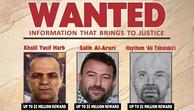
The U.S. Department of State announced on Tuesday rewards of up to $5 million each for information or identification leading to the capture of the following figures: Hamas leader Saleh al-Aruri, and Hezbollah leaders Khalil Yusif Mahmoud Harb and Haytham ‘Ali Tabataba’i.
Aruri is a prominent Hamas leader and an outspoken anti-occupation figure. He is currently living in Lebanon.
“Our country is not immune. In 2011, the Qods Force allegedly was involved in a plan to assassinate the Saudi Ambassador to the United States at a restaurant in Georgetown,” Nathan Sales, ambassador-at-large and coordinator for counterterrorism told the Washington Institute for Near East Policy on Tuesday.
Sales said serious measures have been taken to chase down Hamas leaders, among them the group’s chief Ismail Haneyya over “terror charges”, in reference to their anti-occupation activism.
Seven other Palestinian leaders figure on the US terror blacklist: Mohamed al-Dheif (the commander of the Qassam resistance brigades); Ziad al-Nakhala (Secretary of the Islamic Jihad); Yehya al-Sinwar (Hamas chief in Gaza); Fathi Hamad (senior Hamas leader); Ahmad al-Ghandour (a leader at the Qassam Brigades); Ramadan Shallah (former Secretary-General of the Islamic Jihad); and Rawhi Mushtaha (political bureau member of Hamas).
The State Department on Tuesday also officially designated Nasrallah’s son, Jawad, along with the al-Mujahidin Brigades, as terrorists, subjecting them to the toughest sanctions.
As of 1997, both Hamas and Hezbollah are U.S.-designated terrorist entities.
Aruri is a prominent Hamas leader and an outspoken anti-occupation figure. He is currently living in Lebanon.
“Our country is not immune. In 2011, the Qods Force allegedly was involved in a plan to assassinate the Saudi Ambassador to the United States at a restaurant in Georgetown,” Nathan Sales, ambassador-at-large and coordinator for counterterrorism told the Washington Institute for Near East Policy on Tuesday.
Sales said serious measures have been taken to chase down Hamas leaders, among them the group’s chief Ismail Haneyya over “terror charges”, in reference to their anti-occupation activism.
Seven other Palestinian leaders figure on the US terror blacklist: Mohamed al-Dheif (the commander of the Qassam resistance brigades); Ziad al-Nakhala (Secretary of the Islamic Jihad); Yehya al-Sinwar (Hamas chief in Gaza); Fathi Hamad (senior Hamas leader); Ahmad al-Ghandour (a leader at the Qassam Brigades); Ramadan Shallah (former Secretary-General of the Islamic Jihad); and Rawhi Mushtaha (political bureau member of Hamas).
The State Department on Tuesday also officially designated Nasrallah’s son, Jawad, along with the al-Mujahidin Brigades, as terrorists, subjecting them to the toughest sanctions.
As of 1997, both Hamas and Hezbollah are U.S.-designated terrorist entities.
